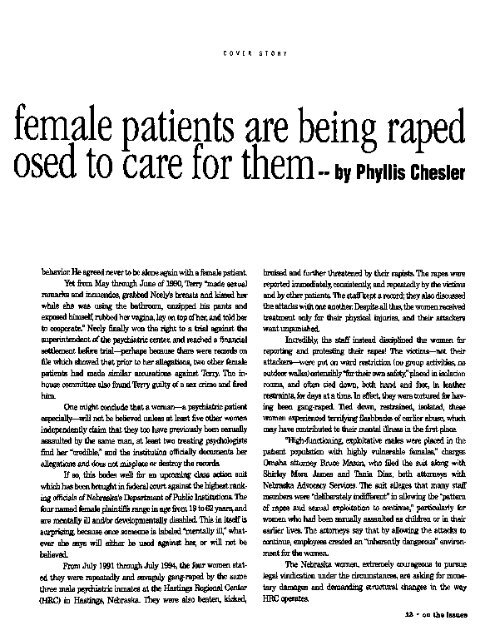women histories, incest sexual abuse. institutionalized. But what if ...
women histories, incest sexual abuse. institutionalized. But what if ...
women histories, incest sexual abuse. institutionalized. But what if ...
You also want an ePaper? Increase the reach of your titles
YUMPU automatically turns print PDFs into web optimized ePapers that Google loves.
C O V E R S T O R Y<br />
female patients are being raped<br />
osed to care for th<br />
behavior. He agreed never to be alone again with a female patient.<br />
Yet from May through June of 1990, Terry "made <strong>sexual</strong><br />
remarks and innuendos, grabbed Neel/s breasts and kissed her<br />
while she was using the bathroom, unzipped his pants and<br />
exposed himself, rubbed her vagina, lay on top of her, and told her<br />
to cooperate." Neely finally won the right to a trial against the<br />
superintendent of the psychiatric center, and reached a financial<br />
settlement before trial—perhaps because there were records on<br />
file which showed that prior to her allegations, two other female<br />
patients had made similar accusations against Terry. The inhouse<br />
committee also found Terry guilty of a sex crime and fired<br />
him.<br />
One might conclude that a woman—a psychiatric patient<br />
especially—will not be believed unless at least five other <strong>women</strong><br />
independently claim that they too have previously been <strong>sexual</strong>ly<br />
assaulted by the same man, at least two treating psychologists<br />
find her "credible," and the institution officially documents her<br />
allegations and does not misplace or destroy the records.<br />
If so, this bodes well for an upcoming class action suit<br />
which has been brought in federal court against the highest ranking<br />
officials of Nebraska's Department of Public Institutions. The<br />
four named female plaint<strong>if</strong>fs range in age from 19 to 62 years, and<br />
are mentally ill and/or developmentally disabled. This in itself is<br />
surprising, because once someone is labeled "mentally ill," <strong>what</strong>ever<br />
she says will either be used against her, or will not be<br />
believed.<br />
Prom July 1991 through July 1994, the four <strong>women</strong> stated<br />
they were repeatedly and savagely gang-raped by the same<br />
three male psychiatric inmates at the Hastings Regional Center<br />
(HRC) in Hastings, Nebraska. They were also beaten, kicked,<br />
bruised and further threatened by their rapists. The rapes were<br />
reported immediately, consistently, and repeatedly by the victims<br />
and by other patients. The staff kept a record; they also discussed<br />
the attacks with one another. Despite all this, the <strong>women</strong> received<br />
treatment only for their physical injuries, and their attackers<br />
went unpunished.<br />
Incredibly, the staff instead disciplined the <strong>women</strong> for<br />
reporting and protesting their rapes! The victims—not their<br />
attackers—were put on ward restriction (no group activities, no<br />
outdoor walks) ostensibly "for their own safety," placed in isolation<br />
rooms, and often tied down, both hand and foot, in leather<br />
restraints, for days at a time. In effect, they were tortured for having<br />
been gang-raped. Tied down, restrained, isolated, these<br />
<strong>women</strong> experienced terr<strong>if</strong>ying flashbacks of earlier <strong>abuse</strong>, which<br />
may have contributed to their mental illness in the first place.<br />
"High-functioning, exploitative males were placed in the<br />
patient population with highly vulnerable females," charges<br />
Omaha attorney Bruce Mason, who filed the suit along with<br />
Shirley Mora James and Tania Diaz, both attorneys with<br />
Nebraska Advocacy Services. The suit alleges that many staff<br />
members were "deliberately ind<strong>if</strong>ferent" in allowing the "pattern<br />
of rapes and <strong>sexual</strong> exploitation to continue," particularly for<br />
<strong>women</strong> who had been <strong>sexual</strong>ly assaulted as children or in their<br />
earlier lives. The attorneys say that by allowing the attacks to<br />
continue, employees created an "inherently dangerous" environment<br />
for the <strong>women</strong>.<br />
The Nebraska <strong>women</strong>, extremely courageous to pursue<br />
legal vindication under the circumstances, are asking for monetary<br />
damages and demanding structural changes in the way<br />
HRC operates.<br />
13 - on the issues

















